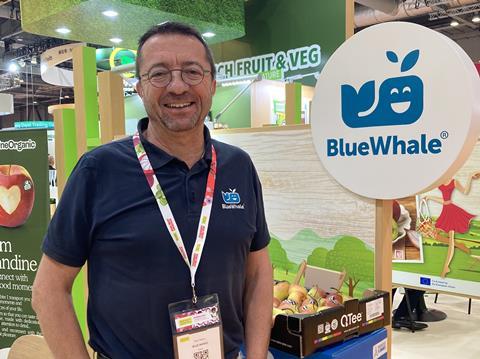As French apple exporters buck the European trend for reduced volumes this season, Blue Whale’s Marc Peyres says unpredictable weather shows the need for open markets and increased trade
It is a reminder of how bad weather conditions were elsewhere that the only big Northern Hemisphere apple producer expecting more fruit than last year is France. Last season, France not only had a low crop – the quality of that crop was also severely affected by a period of very high temperatures, reducing the packout further. This year, according to Blue Whale’s Marc Peyres, it’s a different story.

“This season, it has been the complete reverse,” he says. “The conditions in France have been very good up until the end of August. We have good water reserves for irrigation. It is probably one of the best crops we’ve ever had. The weather in France has been great for both volumes and quality. Colouration has been good. We never sold so many Gala in August at such a high price. It has been a perfect start to the season, but we’ll have to see what happens.”
The only uncertainty remains the weather. The climate, Peyres notes, is definitely changing. “There is more unexpected change during the season,” he says. “But of course not every small change is a problem for the quality of the fruit. It is just a bit more stressful for everyone.”
Much of Europe has been affected by climatic issues, reducing volumes significantly. “It’s just like in France last year,” says Peyres. “That’s why in this business, we need open markets. People talk about local, but they don’t recognise that production relies on the weather, and more and more in the last few years. Today the weather issue is showing how much we need open markets.”
Peyres says it’s important to remember that “local” is not synonymous with high quality. “I’m not against local,” he explains, “but local doesn’t mean quality, and I think the first thing we should be delivering to consumers is a high-quality eating experience. In addition, what we’ve seen many times is that when we concentrate too much on “local”, consumption actually goes down.”
On the Asian market, one country that has continued to grow in recent years for French apple exporters in is Vietnam. “Vietnam has been quite active,” says Peyres. “We used to work in Vietnam a long time ago, when I first started, but at that time it was a very small market and there were only US apples available. So we had some difficulties. Then the market was closed for many years. Since it reopened, we have managed to develop our reach to modern retailers. Now we are coming with new varieties they like. Sometimes it’s surprising - we even sell some Braeburn there. And now for us it is interesting because we had very good success in Vietnam with our new variety, Candine, both in terms of quantities and price.”
Taste-wise Candine offers a great blend that is proving as popular with consumers in Asia as in Europe, according to Peyres. “Candine is a mix between Fuji and Ariane,” he says. “Fuji is a variety of Asia, so people in the region like its taste, sweetness and crunch. Ariane is a French variety that brings some real flavour. Our tests in South-East Asia and Europe have both gone well, so we are sure we can do good things with this variety.”



